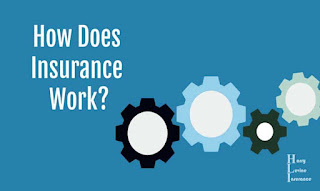Insurance is a vital component of
modern life, providing financial security and peace of mind in the face of unforeseen
events. In this article, we will delve into the world of insurance, starting
with its fundamental definition and moving on to how it operates. We'll also
explore the main types of insurance policies available to individuals and
businesses.
I. Understanding Insurance
·
Defining
Insurance
Insurance is a contract between
an individual or entity (the insured) and an insurance company (the insurer).
The insured pays regular premiums to the insurer in exchange for protection
against specific risks, with the insurer promising to provide financial support
when these risks materialize.
·
The Role
of Risk
Insurance is fundamentally about
managing risk. It allows individuals and organizations to transfer the
financial burden of unexpected events to the insurer. These events could
include accidents, illnesses, property damage, or liability claims.
II. How Insurance Works
·
The
Premiums and Coverage
Insured individuals or entities
pay premiums, usually on a regular basis (monthly, quarterly, or annually). The
amount of the premium is determined by various factors, including the type and
level of coverage, the insured's risk profile, and the insurer's underwriting
process.
·
Policy
Terms and Conditions
Insurance policies come with
specific terms and conditions that outline what is covered, what is excluded,
and any limitations. It's essential for policyholders to thoroughly understand
these terms to ensure they have the coverage they need.
·
Claim
Process
When an insured event occurs, the
policyholder files a claim with the insurance company. The insurer then
assesses the claim and, if it meets the policy's terms and conditions, provides
financial assistance to the policyholder.
III. Main Types of Insurance Policies
·
Life
Insurance
Life insurance provides a
financial benefit to beneficiaries upon the policyholder's death. It can be a
term life policy that lasts for a specified period or a permanent policy that
covers the insured's lifetime.
·
Health
Insurance
·
Auto
Insurance
Homeowners or Renters Insurance
Homeowners and renter’s insurance
policies protect against property damage, theft, and liability. Homeowners'
insurance covers the structure and contents of the home, while renter’s
insurance covers personal belongings in a rented property.
Business Insurance
Business insurance encompasses a
range of policies tailored to protect companies and their assets. This includes
commercial property insurance, liability insurance, workers' compensation, and
more.
Conclusion
Insurance plays a crucial role in
our lives, providing a safety net for unforeseen events that could otherwise
lead to significant financial burdens. By understanding the basics of
insurance, how it operates, and the main types of policies available,
individuals and businesses can make informed decisions to protect their
financial well-being and mitigate risk.






.png)
